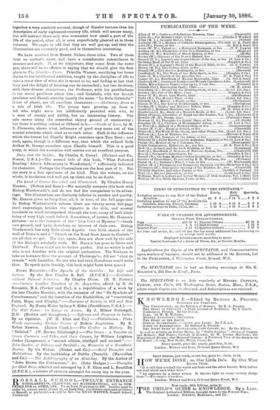The Dawn of the Nineteenth Century in England. By John
Ashton. 2 vols. (Fisher Unwin.)—This work is mainly a compilation from the chronicle of the Annual Register, and a good many, if not moat, of the illustrations of the habits of our forefathers it contains are drawn from the folios of the caricaturists,—especially Gilroy and Rowland. son. It is not with elements gathered from such sources that any- thing like a sufficient picture of society can be composed. It is easy to cull from periodical literature examples enough of the folly and wickedness of an age, but these do not often constitute other than accidental aspects of a stage in the evolution of a people. Such books as the one before us are always popular, because they flatter the self-love of the present generation at the expense of those of the past ; and a peculiar pleasure is often felt in the denigration of our nearer forefathers, round whose figures antiquity has not thrown its halo. We have heard enough and to spare of the drinking, gambling, and coarse habits of the earlier decades of the century, and have sufficiently often been comfortably assured that all that is now changed. So it is ; but a good deal of the change is in the direction
of dissimulation rather than of real amendment. We lead softer and
more correct lives than did our grandfathers and our great-grand- fathers ; but we have undoubtedly lost something of their faith, earnestness, loyalty, and simplicity. Intercourse is less easy, and, in
London at all events, society is more profoundly hollow and absurdly luxurious, than probably at any period of history. The present writer
knows of a house not a mile from Hyde Park Corner, inhabited by a middle-aged pair, who have no children, entertain very little, and employ their wealth only to maintain the useless state of thirty ser-
vants. No doubt there is a positive gain in the progress made during the past three-quarters of a century that outweighs the evil attaching to it. Especially is this the case in respect of political and social organisation ; bat against it must be set the commercial gambling, the mercantile dishonesty, the vast advertising shams, the manifold adulterations, the taste for gorgeousness and gross material luxury, for trivial sensationalism and personal scandal, and the low tone of
political morality—much more inexcusable in these days than seventy years ago—that characterise our own times. It is curious, too, how little the advance that has been made is due, after all, save in a
secondary sense, to political effort. It is to the men of science that we owe our extended command of natural means ; to thinkers and writers that we owe the ameliorating ideas which the Cannings and Peels, by their command of the politician's art, were enabled to introduce into the Constitution. But Mr. Ashton tells us little of the good tendencies
of the decade he describes, or of the mode and degree of its making for better things. Of its coarser and more trivial aspects he has put
together a very readable account, though of flimsier texture than his description of early eighteenth-century life, which will amuse many, but will instruct those only who remember how small a part of the life of the period, after all, is even superficially glanced at in these volumes. We ought to add that they are well got-up, and that the illustrations are extremely good, and in themselves interesting.



































 Previous page
Previous page